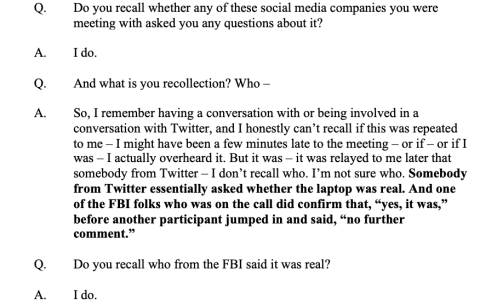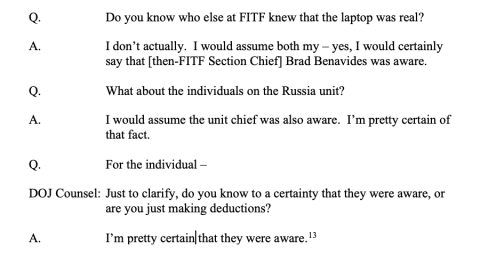According to recently released material, the FBI agents were aware that the discovery of Hunter Biden’s laptop was not the product of Russian misinformation. They had been warning social media firms about a potential Russian “hack and leak” operation prior to the 2020 election.
A taped interview with Laura Dehmlow, the Section Chief of the FBI’s Foreign Influence Task Force (FITF), revealed new information. The House Judiciary Committee and Subcommittee on the Weaponization of the Federal Government conducted the interview on July 17, 2023.
WATCH: Church Leaders PRAYED you’d never see this…
Based on the contents of a laptop, The New York Post published a ground-breaking exposé of suspected influence-peddling by the Biden family. Surprisingly, the FBI opted to avoid asking questions about the legitimacy of the laptop despite their continued interactions with major social media companies.
Social media businesses came to the conclusion that the New York Post report was false information from Russia because they thought the laptop was the result of a hack-and-dump operation. This finally led to the narrative being heavily edited on important social media sites, which had serious repercussions.
The FBI’s Foreign Influence Task Force met with Twitter representatives on October 14, 2020. A Twitter representative asked about the veracity of the laptop described in the Post’s report during the meeting. An FBI lawyer who declined to comment on the laptop’s origin interrupted an analyst from the FBI’s Criminal Investigative Division within the FITF who had begun to validate its existence.

Later on that day, Dehmlow addressed a concern over Hunter Biden’s laptop during a meeting between FITF and Facebook. Dehmlow was questioned about it and replied that the FBI had “no comment,” despite the fact that they were in possession of the laptop and had verified its legitimacy. Numerous FITF members are reported to have known that the laptop was in fact real.

Following the Post’s article’s publication, Facebook restricted the story’s distribution while Twitter prohibited it. The FBI’s actions as a result deprived millions of Americans from having a good understanding of the crucial topic in the 2020 presidential election.
The ramifications of the FBI’s silence on the subject were extensive. The FBI never publicly acknowledged that the laptop was “real” and in their possession before the November 3, 2020, presidential election. According to Dehmlow’s testimony before the Committee, FITF would have had complete authority to alert the firms of a Russian misinformation effort if the Hunter Biden narrative had originated there.
The FBI’s unwillingness to vouch for the legitimacy of the laptop resulted in significant press coverage being censored. This raises questions regarding the FBI’s management of important information, its effects on public perception, and its influence over the election process.
TRENDING: Little-Known Trick Clears Blurry Eyesight
To get a comprehensive breakdown of the incidents and the FBI’s response, read the whole letter written to FBI Director Christopher Wray. To access it, click here.





